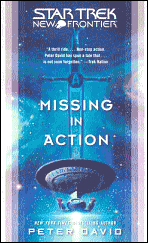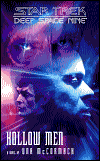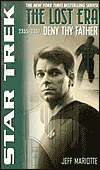TOS: Crucible: KirkThe Star to Every Wandering, by David R. George
Book Review by David Roy
Have you read this book?
There's something missing in The Star to Every Wandering, the third in the "Star Trek: Crucible" series of books, this time dealing with James T. Kirk. The plot is much more straightforward than the previous books, and while David R. George III captures the characterization with his usual flair, the story isn't anywhere near as interesting as Spock and McCoy's books were. George says in the prologue that he wanted a plot that defied expectations left by the first two books, thus scrapping his original outline and coming up with this one, but I'm not sure that was the best choice (of course, I don't know what the previous story was, so I obviously can't say it would have been better. The book is certainly not bad (it is, in fact, very well written). It just doesn't draw your attention like most of George's other books.
All three books in the series will have a starting point of the death of Edith Keeler in the episode "City on the Edge of Forever," and this time we see how Edith has affected his life until the day he died in "Generations." When Picard brings him out of the Nexus in that movie, they do manage to stop Soran from diverting the Nexus to a planet that will millions of people. However, in doing so he causes some sort of temporal disturbance (because of all the time-travel he's done in his career, he's positively brimming with these kinds of "time particles" that will do that) that ends up destroying a lot more than what he saved. He realizes that he should never have left the Nexus that he'd been trapped in since he saved the Enterprise B. But some Jim Kirk does have to work with Picard to keep the timeline stable. Will the Guardian of Forever, that time portal that took him back to meet Edith, be of help? But wasn't it destroyed?
George has Kirk jumping timelines like crazy, meeting up with himself once or twice and generally showing us a "behind the scenes" of what happened when Kirk saved the Enterprise B in "Generations," changing our understanding of what happened without actually changing the events that we saw, except that this does end up changing some of his interactions with Picard on Veridian III. I'm not too sure how I feel about a novelist actually changing what we see in a movie, but if anybody's going to do it, I trust George to do so.
Despite the timeline jumping, however, this is the most straightforward tale in the Crucible series. The other two books flashed back and forth between two eras, but this book stays with Kirk as he does his best to avoid the temporal anomaly that ends up erasing everything he died to save. We do see flashbacks in Kirk's life to a couple of times, but this happens either within the Nexus (where time doesn't really exist) or when Kirk goes to that time period. I really liked how we finally see who this Antonia woman that Kirk mentions in the movie is, and George succeeds in making their relationship interesting to read about. I really enjoyed seeing some of the scenes behind the movie, like how an admiral and good friend manages to coax him back to Starfleet one last time to inspect the Enterprise B.
Unfortunately, the same can't be said for the overarching plot. I found the whole "temporal particles causing mass destruction" plot to be tedious, even if it is just a way for us to see these past aspects of Kirk's life and is the main driving force for Kirk to do what he ends up doing. There's no tension, no real conflict in this story as we see Kirk easily do what he needs to do. All of the emotional examination of what Edith's death has done to Kirk through the years has happened in the past and so doesn't have as much resonance to the reader as it should. McCoy's book examined his whole life, while Spock's book actually had some "current" effect on the character (not counting his appearance in the Next Generation episodes, of course). Kirk's just seemed pointless, wrapped around this non-interesting time-travel plot.
The Star to Every Wandering is also the shortest of the Crucible books, which makes it seem even more abbreviated. George is known for expansive books, and I missed that from him this time. It felt too "Step 1, Step 2, Step 3, we're done," perhaps because we're only seeing one main theme throughout the book.
That's not to say there aren't a lot of strengths in the book, though. George's characterization skills are still top notch, making Antonia an intriguing character that we'd like to know more about her outside of her relationship with Kirk. As is usual, he captures the regulars perfectly, though this time there's basically only Kirk involved. He does seem to have a great desire to rehabilitate the character of Harriman (captain of Enterprise B), with this being the second in-depth look at him trying to show he isn't the idiot that the movie made him out to be. The characterization and the prose are just as good as any other George book, and made this book extremely easy to read and stay interested (despite the rather uninteresting plot).
One final aspect that George gets right is again Trek continuity. George simply revels in the continuity from the original series and movies, and yet again it doesn't feel forced. George even says in his epilogue that he referenced every episode (animated and live action) and every movie in this trilogy, and yet it didn't annoy me like it usually does. I think George handles it with such a loving touch (the fact that this is an anniversary trilogy helps too) that it doesn't become intrusive. Some episodes are only referenced by mentioning a planet, but others have a lot more coverage.
I did enjoy The Star to Every Wandering, but it's definitely the weakest book of the three and it's sad that the series goes out on a lesser note than it should have. It won't make you regret reading the series in order (the books do tie in to each other but tell separate stories), but it will feel like an opportunity missed.
All three books in the series will have a starting point of the death of Edith Keeler in the episode "City on the Edge of Forever," and this time we see how Edith has affected his life until the day he died in "Generations." When Picard brings him out of the Nexus in that movie, they do manage to stop Soran from diverting the Nexus to a planet that will millions of people. However, in doing so he causes some sort of temporal disturbance (because of all the time-travel he's done in his career, he's positively brimming with these kinds of "time particles" that will do that) that ends up destroying a lot more than what he saved. He realizes that he should never have left the Nexus that he'd been trapped in since he saved the Enterprise B. But some Jim Kirk does have to work with Picard to keep the timeline stable. Will the Guardian of Forever, that time portal that took him back to meet Edith, be of help? But wasn't it destroyed?
George has Kirk jumping timelines like crazy, meeting up with himself once or twice and generally showing us a "behind the scenes" of what happened when Kirk saved the Enterprise B in "Generations," changing our understanding of what happened without actually changing the events that we saw, except that this does end up changing some of his interactions with Picard on Veridian III. I'm not too sure how I feel about a novelist actually changing what we see in a movie, but if anybody's going to do it, I trust George to do so.
Despite the timeline jumping, however, this is the most straightforward tale in the Crucible series. The other two books flashed back and forth between two eras, but this book stays with Kirk as he does his best to avoid the temporal anomaly that ends up erasing everything he died to save. We do see flashbacks in Kirk's life to a couple of times, but this happens either within the Nexus (where time doesn't really exist) or when Kirk goes to that time period. I really liked how we finally see who this Antonia woman that Kirk mentions in the movie is, and George succeeds in making their relationship interesting to read about. I really enjoyed seeing some of the scenes behind the movie, like how an admiral and good friend manages to coax him back to Starfleet one last time to inspect the Enterprise B.
Unfortunately, the same can't be said for the overarching plot. I found the whole "temporal particles causing mass destruction" plot to be tedious, even if it is just a way for us to see these past aspects of Kirk's life and is the main driving force for Kirk to do what he ends up doing. There's no tension, no real conflict in this story as we see Kirk easily do what he needs to do. All of the emotional examination of what Edith's death has done to Kirk through the years has happened in the past and so doesn't have as much resonance to the reader as it should. McCoy's book examined his whole life, while Spock's book actually had some "current" effect on the character (not counting his appearance in the Next Generation episodes, of course). Kirk's just seemed pointless, wrapped around this non-interesting time-travel plot.
The Star to Every Wandering is also the shortest of the Crucible books, which makes it seem even more abbreviated. George is known for expansive books, and I missed that from him this time. It felt too "Step 1, Step 2, Step 3, we're done," perhaps because we're only seeing one main theme throughout the book.
That's not to say there aren't a lot of strengths in the book, though. George's characterization skills are still top notch, making Antonia an intriguing character that we'd like to know more about her outside of her relationship with Kirk. As is usual, he captures the regulars perfectly, though this time there's basically only Kirk involved. He does seem to have a great desire to rehabilitate the character of Harriman (captain of Enterprise B), with this being the second in-depth look at him trying to show he isn't the idiot that the movie made him out to be. The characterization and the prose are just as good as any other George book, and made this book extremely easy to read and stay interested (despite the rather uninteresting plot).
One final aspect that George gets right is again Trek continuity. George simply revels in the continuity from the original series and movies, and yet again it doesn't feel forced. George even says in his epilogue that he referenced every episode (animated and live action) and every movie in this trilogy, and yet it didn't annoy me like it usually does. I think George handles it with such a loving touch (the fact that this is an anniversary trilogy helps too) that it doesn't become intrusive. Some episodes are only referenced by mentioning a planet, but others have a lot more coverage.
I did enjoy The Star to Every Wandering, but it's definitely the weakest book of the three and it's sad that the series goes out on a lesser note than it should have. It won't make you regret reading the series in order (the books do tie in to each other but tell separate stories), but it will feel like an opportunity missed.
|
Click here to buy TOS: Crucible: Kirk-The Star to Every Wandering, by David R. George on Amazon
|
TOS: Crucible: Kirk-The Star to Every Wandering, by David R. George on Amazon
| More Books You Might Like |
Comment on TOS: Crucible: Kirk-The Star to Every Wandering, by David R. George
| Comments on TOS: Crucible: Kirk-The Star to Every Wandering, by David R. George |
| There are no comments on this book. |




